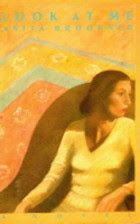Look At Me by Anita Brookner
This is a painful little book. Appropriately so, since its theme is melancholia. Frances Hinton is a reference librarian who catalogues images of psychological disturbance while working extremely hard to maintain her own detachment from the complications of living. She lives in a block of flats in Maida Vale that is almost entirely populated by the elderly, walks to work and visits art galleries on long, oppressive Sunday afternoons. She would like to have friends but makes no effort to cultivate them, until she is taken up by the glamorous Nick and Alix, who are the kind of golden couple who are always surrounded by noise and vitality. Frances, who manages to be one of the world's over-thinkers while remaining essentially blind to what is going on around her, questions her own motives in allowing herself to be captivated by them, but utterly fails to interrogate theirs until too late. At the start of the novel she wields her detachment with a good deal of pride, turning sharp little vignettes of her acquaintances into witty short stories, and a novel is planned (it would be very Barbara Pym, I think):
Look At Me shares a theme familiar from many mid-twentieth-century books, the fear of lonely old age. Frances makes monthly duty visits to Miss Morpeth, a retired librarian, and these are difficult occasions. There is little dignity about poverty in the elderly and Frances is afraid that her own future looks bleak. Her memories of her most recent Christmas, alone in her over-large flat with her late mother's housekeeper, lend urgency to her need for company and affection, for disruption to her ordered days.
I don't find Brookner easy to talk about - her writing is elegant and stylish, her wit sparse but dry, yet you wonder if she chooses to write about the alienated because she doesn't like excessive emotion herself. That's something I can understand, even approve of, but it doesn't leave a lot to enthuse about. Indeed, it would be rather ridiculous to try... So her novels are an occasional, if muted, pleasure. It must be some twenty years since I read Hotel du Lac. That's about the right interval, I should think.
This was 1983 in the Century of Books.
When I feel swamped in my solitude and hidden by it, physically obscured by it, rendered invisible, in fact, writing is my way of piping up. Of reminding people that I am here. And when I have ordered my characters, plundered my store of images, removed from them all the sadness that I might feel in myself, then I can switch on that current that allows me to write so easily, once I get started, and to make people laugh. That, it seems, is what they like to do. And if I manage this well enough and beguile all the dons and the critics, they will fail to register my real message, which is a simple one. 'Look at me,' I would say. 'Look at me.'I like Brookner, but I think I would like her better if she were more Pym herself. There are some delicious acid touches, especially in the exchanges between Olivia, the other librarian, and the regulars, but this is a serious book and, though brief, it is at times quite slow. I did rather want to tell Frances ("I do not like to be called Fanny" she tells us and then almost everyone does) to stop thinking and join a film society or something, but at the same time I could understand why she was so guarded, and I didn't want her to be humiliated.
Look At Me shares a theme familiar from many mid-twentieth-century books, the fear of lonely old age. Frances makes monthly duty visits to Miss Morpeth, a retired librarian, and these are difficult occasions. There is little dignity about poverty in the elderly and Frances is afraid that her own future looks bleak. Her memories of her most recent Christmas, alone in her over-large flat with her late mother's housekeeper, lend urgency to her need for company and affection, for disruption to her ordered days.
I don't find Brookner easy to talk about - her writing is elegant and stylish, her wit sparse but dry, yet you wonder if she chooses to write about the alienated because she doesn't like excessive emotion herself. That's something I can understand, even approve of, but it doesn't leave a lot to enthuse about. Indeed, it would be rather ridiculous to try... So her novels are an occasional, if muted, pleasure. It must be some twenty years since I read Hotel du Lac. That's about the right interval, I should think.
This was 1983 in the Century of Books.



Until now, I had not heard about this author, and from what you say about the book, it does not sound like I have missed out on something I really, really should have read.
ReplyDeleteI know what you mean when you wanted to tell the main character to stop thinking and join a film society or something!
I love reading about Anita Brookner almost as much as I love reading Anita Brookner. Can I post it over at the International Anita Brookner Day blog with a link back to your blog? www.brooknerday.blogspot.com
ReplyDeleteLibrarian, it IS worth reading, though, it's so beautifully written.
ReplyDeleteThomas, I hid for the weekend because I was tired and have only just seen your comment. Please do if you still want to, I'd be delighted. I going to enjoy reading all the posts there - suspect my consumption of her books is about to go up considerably! There's something about her that always intrigues me.
I finally got your review posted at the IABD blog.
ReplyDelete